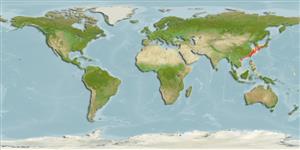分類 / Names
俗名 | 同種異名 | Catalog of Fishes(屬, 種) | ITIS | CoL | WoRMS | Cloffa
Elasmobranchii
板鰓亞綱 (鯊魚與魟魚) (sharks and rays) >
Carcharhiniformes (Ground sharks)
真鯊目 (Ground sharks) >
Proscylliidae (Finback catsharks)
原鯊科 (Finback catsharks)
Etymology: Proscyllium: pro (L.), in front of, probably referring to far forward placement of dorsal fin compared with Scyllium (=Scyliorhinus, Scyliorhinidae). (See ETYFish); venustum: Latin for beautiful, probably referring to its spotted color pattern, as reflected in its local Japanese name Hyozame, meaning Leopard Shark [treated as a junior synonym of P. habereri by some workers]. (See ETYFish).
More on author: Tanaka.
Issue
Weigmann (2016; Ref. 106604) considered the species as valid (citing literature and pers. comm., p29), while as a synonym of Proscyllium habereri Hilgendorf, 1904 in ECoF. Considered here as a provisionally accepted species until further evidence.
Environment: milieu / climate zone / depth range / distribution range
生態學
海洋 居於水底的; 深度上下限 50 - 100 m (Ref. 41299). 溫帶
Northwest Pacific: Japan.
西北太平洋: 日本。
大小 / 重量 / 年齡
Maturity: Lm ? range ? - ? cm
Max length : 60.0 cm TL 雄魚/尚未辨別雌雄; (Ref. 41299)
Oviparous (Ref. 50449).
卵生的.(參考文獻 50449)
Life cycle and mating behavior
Maturities | 繁殖 | Spawnings | Egg(s) | Fecundities | 仔魚
Oviparous, paired eggs are laid. Embryos feed solely on yolk (Ref. 50449).西北太平洋: 日本。
Nakabo, T., 2002. Fishes of Japan with pictorial keys to the species, English edition I. Tokai University Press, Japan, pp v-866. (Ref. 41299)
人類使用
工具
特別的報告
下載 XML
網路資源
Estimates based on models
Preferred temperature (Ref.
123201): 16.8 - 24.3, mean 22 °C (based on 41 cells).
Phylogenetic diversity index (Ref.
82804): PD
50 = 0.6328 [Uniqueness, from 0.5 = low to 2.0 = high].
Bayesian length-weight: a=0.00389 (0.00180 - 0.00842), b=3.12 (2.94 - 3.30), in cm total length, based on all LWR estimates for this body shape (Ref.
93245).
營養階層 (Ref.
69278): 4.1 ±0.6 se; based on size and trophs of closest relatives
回復力 (Ref.
120179): 低的, 最小族群倍增時間4.5 - 14 年 (Fec assumed to be <100).
Fishing Vulnerability (Ref.
59153): Moderate vulnerability (44 of 100).
